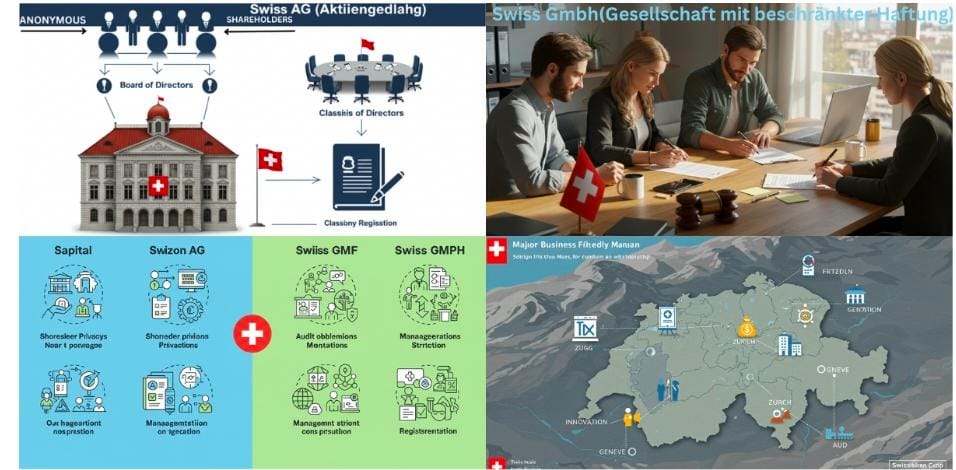What are Swiss AG and Swiss Gmbh: A 2025 Guide to Company Formation in Switzerland
Switzerland is one of the most business-friendly countries in Europe, attracting entrepreneurs and corporations from around the globe. Whether you’re a startup founder, investor, or business consultant, knowing the difference between a Swiss AG and a Swiss Gmbh is crucial. In this guide, we’ll explore both company types, their structures, and what makes each ideal for different business needs in 2025.
What Is a Swiss AG?
A swiss ag (Aktiengesellschaft), also referred to as a Swiss joint-stock company or Swiss corporation, is typically used by larger businesses. It offers strong privacy protection, share transfer flexibility, and a recognized corporate structure. Many global firms opt for a Switzerland AG company due to its credibility and compliance with international standards.
One of the defining features of an AG is that shareholders can remain anonymous, as their names are not publicly listed in the commercial register. This structure is not as person-focused as the Gmbh, and shareholders do not automatically gain management rights. Their role is primarily financial unless specified otherwise in the corporate charter.
Key Features of a Swiss AG
- Minimum Share Capital: CHF 100,000 (of which CHF 50,000 must be paid-in)
- Directors: At least one director must be a Swiss resident
- Liability: Limited to company assets
- Ideal for: Medium to large businesses, public companies, and international investors
- Legal Foundation: Governed by Articles 620–763 of the Swiss Code of Obligations
- Audit: Required if the company exceeds thresholds or is public
- Incorporation: Requires a notarial act and entry in the commercial register
Swiss AG Details
| Aspect | Description |
| Company Type | Swiss AG (Aktiengesellschaft) |
| Structure | Swiss joint-stock company |
| Minimum Capital | CHF 100,000 (CHF 50,000 paid-in) |
| Ideal For | Medium to large businesses, corporations |
| Director Requirement | At least one Swiss resident director |
| Shareholder Visibility | Private (not listed) |
| Transfer of Shares | Freely transferable |
| Audit Requirement | Yes, for large/public firms |
| Legal Personality | Upon commercial registration |
| Popular Terms | Swiss corporation, Switzerland AG, Swiss Aktiengesellschaft |
What Is a Swiss Gmbh?
A swiss gmbh (Gesellschaft mit beschränkter Haftung), commonly known as a Swiss limited liability company, is more suited for small to medium enterprises (SMEs). It combines a flexible structure with a lower capital requirement than an AG.
In contrast to the AG, the Gmbh is more transparent — shareholders’ names appear in the public commercial register. This setup is considered more personal and is often chosen by founders who are directly involved in the day-to-day operations. Each shareholder has both ownership and management rights unless these are delegated formally.
Key Features of a Swiss Gmbh
- Minimum Share Capital: CHF 20,000 (must be fully paid-in)
- Ownership: Shareholders are publicly listed
- Liability: Limited to the amount of capital invested
- Ideal for: Startups, SMEs, family businesses
- Audit: Not required for companies with under 10 full-time employees and shareholder approval
- Language Flexibility: Can operate in German, French, Italian, or English
Swiss Gmbh Details
| Aspect | Description |
| Company Type | Swiss Gmbh (Gesellschaft mit beschrankter Haftung) |
| Structure | Swiss Limited Liability Company |
| Minimum Capital | CHF 20,000 (fully paid-in) |
| Ideal For | Startups, SMEs, family-owned businesses |
| Director Requirement | No Swiss residency required, but advisable |
| Shareholder Visibility | Public (listed in register) |
| Transfer of Shares | Restricted unless stated otherwise |
| Audit Requirement | Optional, based on company size |
| Legal Personality | Upon commercial registration |
| Popular Terms | Gmbh Switzerland, Swiss Gmbh registration, Swiss SARL company |
Swiss AG vs Swiss Gmbh: A Quick Comparison
But when it comes to setting up a business in Switzerland, the decision between a Gmbh (Gesellschaft mit beschränkter Haftung) and an AG (Aktiengesellschaft), as the business structure is so neatly called, is important. The two structures are very similar; both provide limited liability and are subject to the Swiss Code of Obligations – however, they are designed to suit different business requirements and sizes.
This is why a Gmbh is often the choice for an owner of a small to medium-sized enterprise (SME): the given capital requirement is lower and its management lies in clear and simple structure. It requires a paid up capital of CHF 20,000 at least and this amount must be paid-in upon the registration. The identities of shareholders are public and registered, possessing both transparency and privacy limitations. Management is usually with the shareholders themselves thereby allowing for personal oversight of day to day business activities.
On the other hand, an AG is appropriate for bigger companies or if you want to bring in external investors. It has a minimum capital of not less than CHF 100,000, at least 50,000 of which must be paid up on the formation of the company. Shareholders’ identity may be kept anonymous as their particulars are not publicly disclosed, leading to more privacy. An AG requires a board of directors, and shares are more readily transferable, which can pave the way for an investment or even a public listing.
Really the decision between Gmbh and AG depends on what type of capital structure is desired, privacy requirements the company may have and long term business strategy. The following table provides a summary comparison between the two entities:
| Feature | GmbH | AG |
| Minimum Capital | CHF 20,000 (fully paid upon incorporation) | CHF 100,000 (minimum CHF 50,000 paid upon incorporation) |
| Shareholder Anonymity | Shareholders’ details are publicly registered | Shareholders can remain anonymous |
| Management Structure | Managed by shareholders or appointed directors | Requires a board of directors |
| Share Transferability | Transfers require approval from other shareholders | Shares are freely transferable |
| Ideal For | Small to medium-sized enterprises (SMEs) | Larger businesses or those seeking external investment |
| Public Listing | Not eligible for public listing | Eligible for public listing |
| Regulatory Requirements | Less stringent reporting and auditing requirements | More rigorous reporting and auditing obligations |
This comparison aims to provide clarity on the fundamental differences between a GmbH and an AG, assisting entrepreneurs and business owners in making informed decisions aligned with their strategic goals.
Why Choose Switzerland for Company Formation?
- Stable economy and strong banking system
- Favorable tax regimes for corporations
- Multilingual workforce and high innovation index
- Strategic location in the heart of Europe
- Transparent legal system and efficient bureaucracy
- Access to full-service solutions: from incorporation to compliance, bank account opening, Swiss phone numbers, accounting, and tax advisory
Switzerland remains one of the top jurisdictions in 2025 for international business setups.
What Real Entrepreneurs Are Saying
“Setting up our Swiss AG was a game-changer. The credibility it gave us with international clients was immediate.” – Lara M., Zurich-based Fintech Founder
“We went with a Swiss Gmbh for our family-owned café chain. It was simple, straightforward, and fit our budget.” – Jonas F., Lucerne Entrepreneur
These testimonials underline how diverse business owners choose based on needs, not just trends.
Top Mistakes to Avoid When Setting Up in Switzerland
- Not consulting a local expert – Swiss regulations are precise.
- Underestimating costs – Especially with AG setups.
- Choosing the wrong structure – Many startups overreach by going for AG.
- Ignoring tax planning – Switzerland offers different cantonal advantages.
- Skipping post-setup services – Businesses often overlook essentials like accounting, tax declarations, or even setting up a proper Swiss business phone line.
How to Choose the Right Canton
Switzerland is divided into 26 cantons, each with its tax rates, administrative procedures, and business incentives. Choosing the right canton can impact your:
- Corporate tax obligations
- Speed of company registration
- Language of administration
- Local business support
Popular Cantons for Business
| Canton | Benefits |
| Zug | Low taxes, international business hub |
| Zurich | Access to talent, strong infrastructure |
| Geneva | International organizations, global reach |
| Vaud | Innovation centres, tech-friendly policies |
FAQs About Swiss AG and Swiss GmbH
What is the main difference between a Swiss AG and a Swiss Gmbh?
The main differences lie in share capital, privacy, and ideal use cases. AG is better for large firms, while Gmbh suits SMEs.
Can a foreigner own a Swiss company?
Yes. Foreigners can own shares in both AG and Gmbh. However, at least one director must reside in Switzerland.
Which is better for startups: AG or Gmbh?
A Swiss Gmbh is typically better for startups due to lower capital requirements and a simpler management structure.
How long does it take to register a company in Switzerland?
Generally, 2 to 4 weeks, depending on the type of company and documentation readiness.
Are there any annual compliance requirements?
Yes. Both AG and Gmbh must submit annual financial statements and may be subject to audit, depending on their size.
Final Thoughts
Choosing between a Swiss AG and a Swiss Gmbh depends on your business goals, capital, and privacy preferences. While a Swiss AG offers prestige and flexibility for large entities, a Swiss Gmbh is cost-effective and ideal for smaller ventures.
If you’re starting small and want transparency, simplicity, and lower risk, go for a Swiss Gmbh. If you’re aiming to scale big and attract global investors, a Swiss AG may be the better fit.
By understanding the nuances between these structures and leveraging full-service setup solutions available in Switzerland, you can build your company on solid ground.
Whether you need a registered address, accounting help, or strategic tax guidance, Switzerland offers a comprehensive framework to launch and grow your business successfully.

